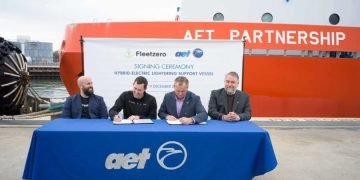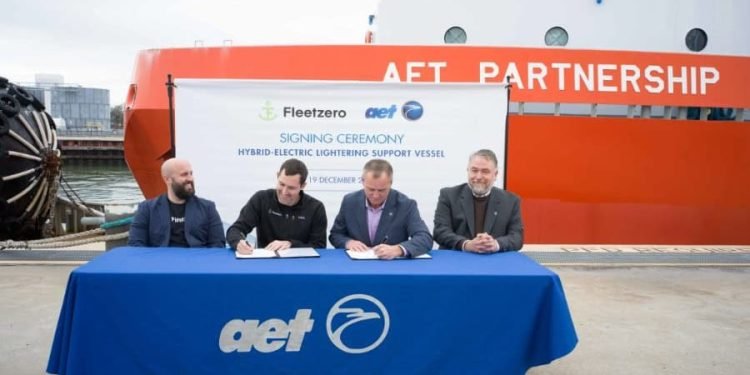By Maria Kalamatas – March 10, 2025
In a landmark move for sustainable maritime logistics, AET, a global leader in energy transportation, has partnered with Fleetzero to develop the world’s longest-range plug-in hybrid-electric vessel. The agreement marks a significant step in the industry’s transition toward greener shipping solutions and carbon reduction.
Transforming Maritime Sustainability
The signing ceremony, held at AET’s Offshore office in Galveston, Texas, formalized the partnership between AET and Fleetzero, a specialist in modular marine battery technology. Under this agreement, AET will retrofit one of its Lightering Support Vessels (LSVs) with a state-of-the-art plug-in hybrid-electric propulsion system. The vessel will primarily operate on battery power, reducing greenhouse gas emissions by approximately 82% compared to conventional LSVs.
“This partnership marks a pivotal step in our decarbonization journey and energy transition strategy,” stated Zahid Osman, President & Group CEO of MISC Group, the parent company of AET. “By integrating plug-in hybrid-electric solutions into our fleet, we are transforming ambition into action to deliver more energy with fewer emissions.”
Innovation in Maritime Electrification
FleetZero’s modular marine battery system will power the hybrid-electric vessel, significantly cutting fuel consumption and maintenance costs. The expected environmental impact includes a reduction of 1,220 tonnes of greenhouse gas emissions, aligning with global maritime decarbonization efforts.
Steven Henderson, Co-Founder and CEO of Fleetzero, emphasized the broader implications of the project: “This initiative advances marine electrification in a commercially viable way, drastically reducing emissions and improving operational efficiency. Our technology is built by mariners for mariners, ensuring safety and ease of operation.”
A Model for Future Fleet Decarbonization
The project serves as a pilot for future hybrid-electric vessel deployment across AET’s and MISC Group’s fleets. It also positions both companies at the forefront of sustainable shipping, reinforcing their commitment to cleaner maritime transport.
As global shipping faces increasing regulatory pressures to cut carbon emissions, innovations like hybrid-electric vessels are expected to play a crucial role in the industry’s transformation.
The Logistic News will continue to track the latest advancements in green shipping and sustainable logistics solutions.
Stay tuned for more updates on the future of maritime decarbonization.























